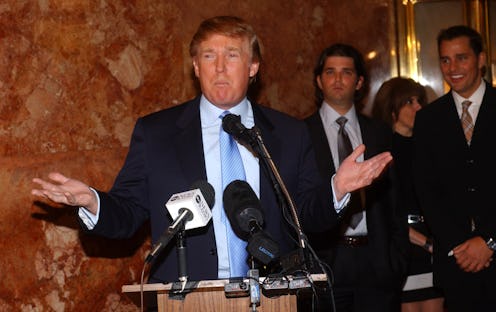News
This Timeline Of Donald Trump's Political Affiliations Is Almost Too Hard To Believe

He was elected president as a Republican, and his time in office so far has brought with it a number of GOP policy victories. However, the Republican president hasn't always occupied that spot on the political spectrum — in fact, according to a Politico report from 2015, Donald Trump was once a Democrat, and he used to hold several policy positions that his Republican colleagues in the White House and in Congress definitely would not agree with.
Trump first registered as a Republican in 1987, which was also the first time he ever joined any party, according to Newsweek. He then dropped the GOP in 1999 and instead joined the Independence Party. That didn't last long, though, because in 2001 this site reports that he joined up with the Democrats instead. In 2009, then, he listed himself as a Republican again — before saying that he didn't want to be a member of any party in 2011. Finally, Newsweek reported that Trump re-joined the Republican party in 2012, and he hasn't left it since them. Only three years later, in fact, Trump formally announced that he was running for president as a Republican.
Another way of judging his political history is through his political donations, which NPR investigated in 2015. According to its report, Trump's political donations were more or less evenly split until about 2010, when Trump finally stopped donating to Democrats and began donating exclusively to Republicans. At that point he also significantly upped his political donations, with 2012 — the year of Obama's second presidential election victory — as his biggest year.
His history of donations to Democratic presidential candidates was something that Trump got attacked for during the Republican primary. Politifact, for instance, pointed out that Jeb Bush in particular used Trump's history of Democratic campaign contributions and membership to disparage him. However, Politifact also emphasized that Bush used several claims that were only half true — namely that Trump had been a Democrat for longer than he had been a Republican "in the last decade" and that Trump had donated more to Democrats than to Republicans. Looking at the decade from 2005-2015, Trump was only a Democrat from 2005-2009, and then he was a Republican from 2009-11 and then from 2012 onwards.
And while NPR's reporting shows conclusively that Trump's more recent donations to GOP candidates far outstrip the total amount he's donated to Democratic candidates, there are numerous big name Democratic politicians who have benefitted from Trump's money. According to the Open Secrets Blog about money in politics, Trump has given money to current enemies like Chuck Schumer, Kirsten Gillibrand, and Joe Biden.
Trump has also self-identified as a Democrat, like in a CNN interview with Wolf Blitzer in 2004. "In many cases, I probably identify more as Democrat," Trump said, and at the time he was a registered Democrat. He continued:
It just seems that the economy does better under the Democrats than the Republicans. Now, it shouldn't be that way. But if you go back, I mean it just seems that the economy does better under the Democrats. ...But certainly we had some very good economies under Democrats, as well as Republicans. But we've had some pretty bad disaster under the Republicans.
And when the Washington Post put together a compilation of policy positions that Trump has expressed holding over the past several decades, it becomes clear that he really has held views that would place him squarely on the left these days. According to the outlet's work, he's been pro-choice, in support of an assault weapons ban, and even in favor universal healthcare — but now, none of that is true. Trump may have been a Democrat in the past, but he's certainly not working towards Democratic goals now.